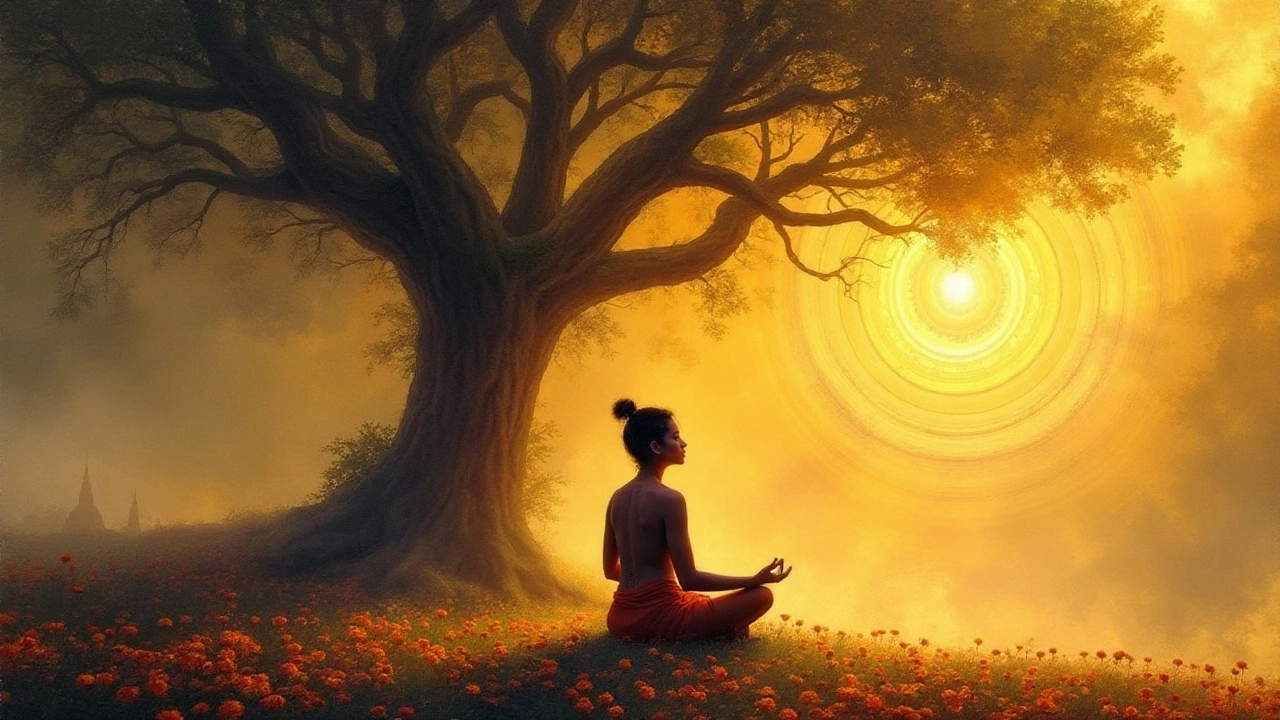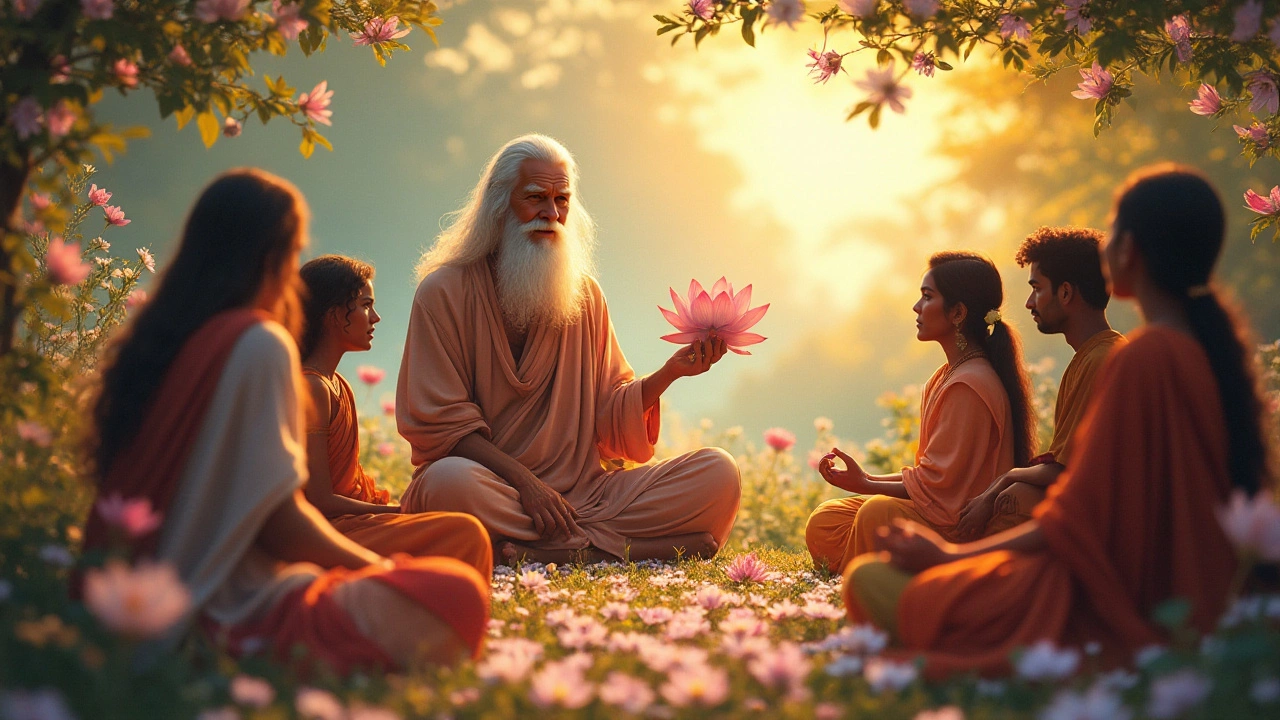Exploring India's Deep Spiritual Roots: A Journey into Spiritual Quotes
 Feb, 1 2025
Feb, 1 2025
India's spiritual heritage has been an enigma to many across the world. Yet, within its vast expanse lies a testament to the relentless pursuit of truth and inner peace. This land of diversity is steeped in countless traditions, each offering a distinct path towards spiritual awakening.
The spiritual practices in India are deeply rooted in its ancient religious texts and culture, often reflected in the profound sayings and quotes that have passed down generations. These gems of wisdom continue to inspire and guide people seeking meaning and understanding of life.
Modern India still sees spirituality playing a crucial role, adapting timeless teachings to fit contemporary life. Spiritual quotients flourished in Indian literature, from epic tales to simple philosophical sayings, offering sage advice and deeper insights. Whether you're a seeker or simply curious, unraveling the spiritual tapestry of India offers a transformative journey.
- Historical Context of Indian Spirituality
- Influence of Religion on Spiritual Practices
- Timeless Indian Spiritual Quotes
- Spirituality in Modern Indian Society
Historical Context of Indian Spirituality
To truly understand the depth of Indian spirituality, one must look back at its rich tapestry of history. The roots of spirituality in India can be traced far beyond the iron age, to the times when the earliest religious texts, the Vedas, were composed. These texts form the foundation for spiritual thought, laying down rituals, hymns, and philosophies aimed at understanding and connecting with the universe. Each verse is more than just an ancient script; it is a window into the inner workings of the mind and soul, predating many organized religions of the world.
In addition to the Vedas, the ancient Indian civilization witnessed the rise of Buddhism and Jainism. These religions emphasized meditation and asceticism, encouraging individuals to seek enlightenment by renouncing worldly desires. This spiritual awakening was not just confined to India but spread widely across Asia, influencing countless cultures and practices. A quote by Swami Vivekananda captures this ethos beautifully:
"Arise, awake, and stop not till the goal is reached."His words echo the determined spirit of a nation rooted in spiritual exploration.
The Bhagavad Gita, another monumental text, further enriched the spiritual discourse. Its teachings on dharma (duty) and karma (action) still resonate with people today, offering a philosophical framework to cope with life's challenges. As do the teachings of saints like Kabir and Guru Nanak, who advocated for a simpler way of life centered on love, devotion, and unity. Their profound messages, often shared through poetry and song, continue to inspire millions, showcasing the profound impact of spiritual quotes in shaping thoughts and attitudes.
The advent of modern Indian movements in the late 19th and early 20th centuries, including those led by figures such as Mahatma Gandhi, reinforced India's spiritual narrative by blending ancient beliefs with contemporary ideals of freedom and equality. Gandhi’s philosophy of nonviolence, or 'Ahimsa,' drew heavily from Jain teachings, promoting peaceful resistance as a powerful force for change. This period marked a resurgence of spiritual thought, aligning with political movements and uplifting the collective consciousness of the populace.
Integration into Daily Life
In India, spirituality is not restricted to lofty beliefs or remote monasteries; it is an integral part of daily life. From dawn prayer rituals and yoga practices to evening meditation and chanting, the continuum of spiritual activities is woven into the fabric of everyday existence. Temples, mosques, and gurudwaras are not merely places of worship but also centers for community gathering and collective growth, nurturing both faith and friendship among their followers.
The historical context of Indian spirituality isn't a mere recount of events; it is a living legacy that continues to evolve. It is an invitation to embark on a journey inward, where exploring the tenets of the past can illuminate the path to the future. The spiritual landscape of India, rich with wisdom and stories, beckons all who seek truth, offering diverse perspectives and timeless teachings that remain relevant in a fast-paced, ever-changing world.
Influence of Religion on Spiritual Practices
India's religious landscape is a tapestry of vibrant beliefs and practices that date back thousands of years. It's hard to overstate the influence of religion on the country's spiritual life. Hinduism, Buddhism, Jainism, and Sikhism, all of which originated in India, have profoundly shaped the region's spiritual perspectives. These religions offer various paths to self-realization and enlightenment, each underscoring the importance of internal exploration. Hinduism, with its multitude of deities, rituals, and philosophies, has provided a rich framework for spiritual practice. It emphasizes karma, dharma, and moksha as pillars of life, imparting timeless lessons that individuals incorporate into their daily routines.
Within these religions, spiritual practices are not confined to temples or sacred spaces. Rather, they extend into daily life, influencing everything from social interactions to personal goals. Buddhist teachings, for example, advocate for mindfulness and meditation as tools for attaining enlightenment. These have become cornerstones not only for religious followers but also for those pursuing a secular path to mental peace. In Islam, the practice of prayer several times a day instills a rhythm of reflection and devotion, similarly shaping spiritual consciousness. Often in India, religion acts as a common thread between diverse communities, uniting them through shared spiritual goals, even while their practices might differ.
The notion of community worship and festivals is another aspect where religion influences spirituality deeply. Festivals such as Diwali, Eid, and Vaisakhi are celebrated with immense enthusiasm, emphasizing collective spiritual joy which naturally follows the tenets of religion. These occasions provide a platform for spiritual expression that is both communal and deeply personal, allowing individuals to experience spirituality publicly. Across rural and urban settings in India, numerous local religious festivals are celebrated, each adding a nuanced layer to spiritual practices and traditions. They serve as vehicles for transmission of customs and keep ancient traditions alive.
For many Indians, spiritual practices are tightly linked to their religious beliefs but are highly personal in interpretation and execution. The influence of grand spiritual texts like the Bhagavad Gita, Guru Granth Sahib, and Tipitaka reinforces the spiritual way of life. These scripts are reservoirs of knowledge, guiding not just spiritual practices but also providing ethical compasses for living. They encourage introspection and inspire meditation, helping individuals to connect deeply with their inner selves. As the Dalai Lama once said,
“This is my simple religion. There is no need for temples; no need for complicated philosophy. Our own brain, our own heart is our temple; the philosophy is kindness.”This quote encapsulates how deeply intertwined spiritual pursuits are with religious teachings in India.

Timeless Indian Spiritual Quotes
India’s spiritual landscape is adorned with countless quotations that have been passed down through centuries, reflecting the country's deep commitment to the pursuit of spiritual wisdom. These spiritual quotes emanate from diverse sources, including ancient scriptures, philosophical texts, and the utterances of sages and saints. Each quote offers a unique window into the spiritual beliefs and values that pervade Indian culture. Such sayings are not just philosophical discussions; they hold practical wisdom applicable to daily life, providing guidance and inspiration for those seeking solace or enlightenment.
Some of the most resonant spiritual quotes in India come from the Bhagavad Gita, a revered scripture that is part of the epic Mahabharata. This ancient text dialogues between Lord Krishna and the prince Arjuna, exploring intricate themes of duty, righteousness, and devotion. One memorable quotation is, "The soul is neither born, and nor does it die"—a profound declaration that underscores the eternal nature of the soul, a central tenet in many Indian religions. This idea affirms the continuity of existence beyond physical life, offering comfort and perspective on the challenges and transitions one may face.
Beyond religious texts, historical figures like Mahatma Gandhi contributed to India's spiritual canon with their own reflections. Gandhi once articulated, "Live as if you were to die tomorrow. Learn as if you were to live forever." This quote resonates with the Indian ethos of balancing practical life with spiritual pursuits, encouraging individuals to remain grounded in the present while nurturing a continuous thirst for knowledge and understanding. Such insights highlight the dynamic interaction between action and contemplation, a cornerstone of Indian spiritual practice.
Indian spiritual heritage is also richly expressed through the works of poets and saints like Kabir and Rumi. Their words provide vivid imagery and evocative lessons about love, life, and the divine. Kabir often used metaphor and paradox to convey his messages, such as when he said, "I felt in need of a great pilgrimage, so I sat still for three days, and God came to me." This profound use of contradiction points to the Indian belief that spiritual enlightenment is often found not in movement or searching, but in stillness and introspection. Such timeless wisdom continues to inspire people around the world.
Today, spiritual quotes in India are as relevant as ever, shared widely across various media and forms of communication, from books to social media. They serve not just as relics of the past, but as vibrant truths that resonate with contemporary lives. In an ever-changing world, these quotes remind individuals of the perennial values and truths that form the foundation of a spiritually enriched life. As such, they remain a beacon for those traveling on their spiritual journeys, offering insights that transcend the boundaries of time and culture.
Spirituality in Modern Indian Society
Modern India stands at a fascinating crossroads where ancient spiritual wisdom meets the fast-paced dynamics of a digitally driven world. Despite the technological advancements and urbanization impacting the country, the essence of India's spirituality remains resilient. This vibrant tradition has managed to adapt and evolve, subtly weaving itself into everyday life. Spiritual practices such as yoga and meditation have gained international traction, with millions around the globe seeking serenity through these ancient Indian disciplines. A walk through the congested streets of an Indian metropolis will reveal yoga studios and meditation centers flourishing alongside tech startups, highlighting how spirituality coexists with modernization.
The youth, often perceived as a generation distanced from their roots, are rediscovering spiritual tenets through the lens of social media and digital platforms. Influencers share daily doses of spiritual quotes and wisdom from Indian sages that resonate with people searching for balance and purpose. The resurgence of interest in spiritual tourism reflects a growing need to connect with a deeper sense of being. Places like Rishikesh and Varanasi continue to draw large numbers, not just for their religious significance but for their potential to provide transformative spiritual experiences.
The Role of Technology
Technology acts as both a bridge and a barrier in this spiritual journey. While it allows spiritual teachings to reach a broader audience, it also risks diluting the purity of these messages. Digital detox retreats are springing up to counter this, offering an oasis of calm amidst the constant chaos of connectivity. People realize that spirituality doesn't necessarily mean shunning modern life but integrating core values to enhance personal well-being. A study revealed that 57% of urban Indians regularly engage with spiritual content online, indicating a profound, adaptive relationship with technology."In the middle of modern existence, medals and money, there is still a need for a return to the very roots that formed the spirit of this ancient land." —Narayana Murthy, Indian industrialist and co-founder of Infosys
Educational institutions are also recognizing the significance of nurturing an individual's spiritual side. Some schools and universities have incorporated courses on spiritual leadership and philosophy into their curricula, understanding that such teachings can build more compassionate and mindful individuals. Many Indians are turning to ancient philosophies like Vedanta and Bhagavad Gita to find solutions to contemporary issues, emphasizing timeless Indian spiritual insights. Even in business leadership, there's a trend toward embracing principles like mindfulness and ethics rooted in spirituality for a more holistic approach to success.